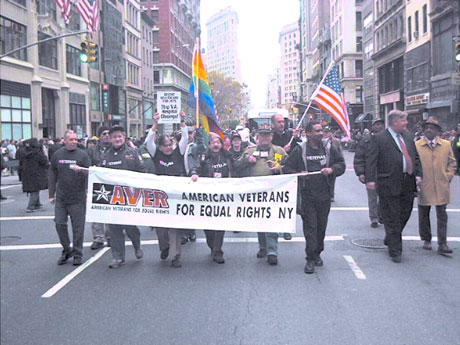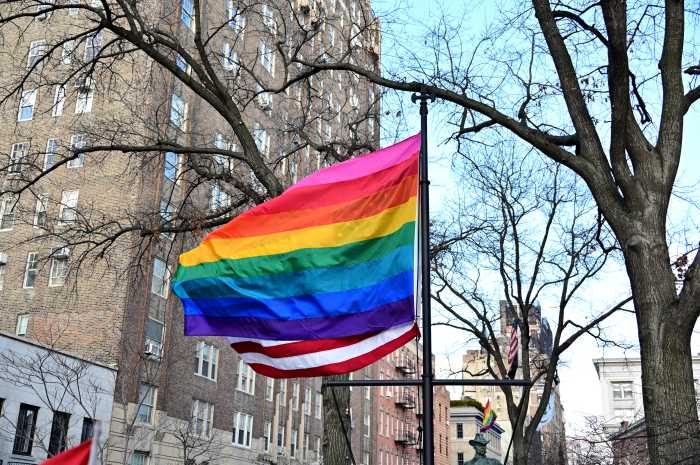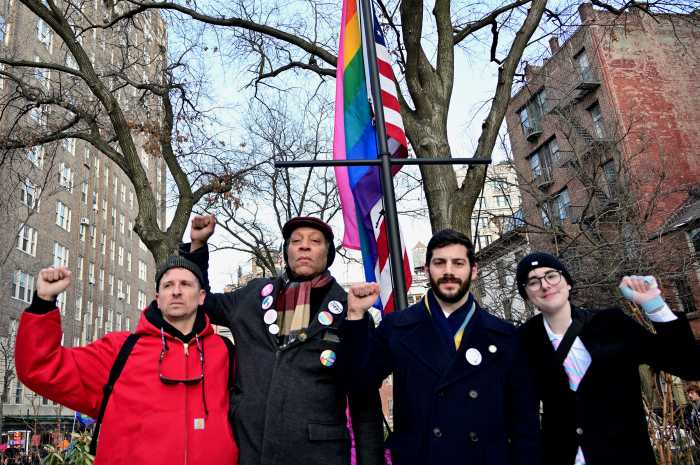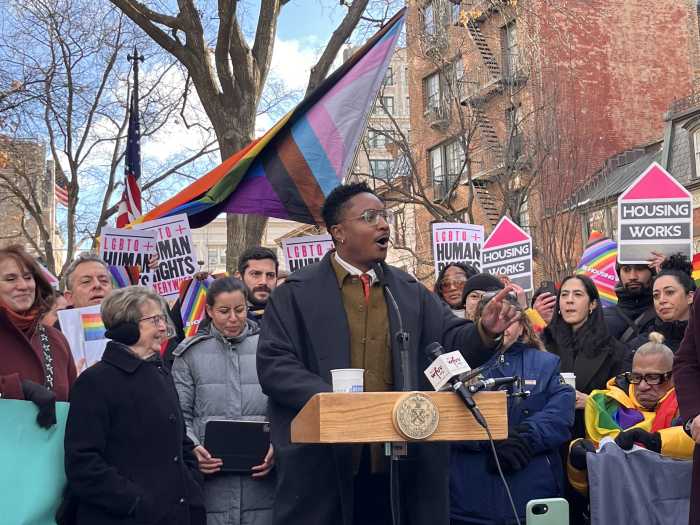A dispute over a non-profit’s name involves dueling dictionaries, changing attitudes
When New Yorkers aiming to apply the direct action civil disobedience techniques of ACT UP to the movement for gay and lesbian visibility founded Queer Nation in March 1990, their choice of a name was self-consciously transgressive. In a manifesto distributed at the Gay Pride March that June, the group wrote, “How can I convince you, Brother, Sister, that your life is in danger? That every day you wake up alive, relatively happy, and a functioning human being, you are committing a rebellious act. You as an alive and functioning Queer are a Revolutionary.”
The Queer Nation activists sought to empower themselves by re-appropriating a word that for generations had been used to demean and ridicule homosexuals.
Scarcely more than a decade later, the word queer has been mainstreamed far beyond the reasonable expectation anyone could have had in 1990. This summer, “Queer Eye For the Straight Guy” proved such a winner on Bravo that for several weeks it jumped into a prime time spot on NBC, the cable company’s corporate parent. This week, an Associated Press story run in newspapers across the nation charted the evolution of the term queer from “an anti-gay word… [with] a hurtful edge” into the “mainstream” discourse.
Yet, in spite of the impressive makeover achieved by the term queer in popular culture, New York State continues to consider the word unacceptable.
In a letter dated June 10 of this year, the New York State Department of State denied the application for a Certificate of Incorporation submitted by a non-profit group that calls itself Queer Awareness. The letter specifically cited a provision of the state not-for-profit corporation law that says that corporate names “shall not contain any word or phrase, or any abbreviation or derivation thereof, which, separately, or in context, shall be indecent or obscene or shall ridicule or degrade any person, group, belief, business or agency of government or indicate or imply any unlawful activity.”
The Department of State’s position on the name Queer Awareness was reaffirmed in two subsequent letters dated June 30 and July 28, and now Christopher Barton Benecke, a master’s degree student in gender politics at New York University who filed the incorporation papers, is suing Randy A. Daniels, New York’s Secretary of State, on the grounds that the corporation law is unconstitutional and has been applied in an arbitrary and capricious manner.
“Queer is a word I’ve always used,” explained Benecke, who is 24 and works part-time in the Manhattan law office of Keith Halperin, who is representing him in the lawsuit. Describing his master’s thesis that he expects to complete next Spring, Benecke said it is an “interdisciplinary” examination of the impact of gay rights on the same-sex debate “bringing together queer theory and public policy.” As an undergraduate at the University of California at Berkeley, he helped found that campus’ first queer housing cooperative.
Benecke is working with two friends of his from Berkeley in launching Queer Awareness, which he described as an advocacy group that will use public education tools—from billboards to speeches at high schools—to help “get rid of prejudice, make us more human, and make others less likely to characterize us in negative terms.” He said the group would also create an online database cataloguing state law provisions relevant to the lives of gay, lesbian, bisexual, and transgender (LGBT) New Yorkers.
When Benecke’s initial application for incorporation was denied, he wrote back to the Department of State addressing the possible concerns it might have under the corporation law provisions it cited. After disposing of the notion that the word queer might involve either obscene or unlawful connotations, Benecke challenged the notion that it must be interpreted as a term that would “ridicule or degrade” LGBT people. He noted that the “American Heritage Dictionary” discusses queer as an example of a “reclaimed word… formerly used solely as a slur but that has been semantically overturned by members of the maligned group, who use it as a term of defiant pride.” The aim of his group, Benecke wrote, was to “further [the] reclamation” of the word queer.
Benecke also raised an ironic precedent in New York law for his claims. In the early 1970s, the New York Department of State refused the not-for-profit incorporation of the Gay Activist Alliance, a Manhattan gay liberation organization formed in the early aftermath of the 1969 Stonewall Riots, deeming that the name gay was inappropriate under state statute. Justice P.J. Herlihy, in 1972, overruled the state’s decision for being arbitrary, writing, “There is no valid reason, in our opinion, for concluding that the name ‘Gay Activist Alliance’ is inappropriate. The word ‘gay’ is not a word proscribed by statute from use in the title of proposed corporation. Neither is it obscene or vulgar even though it is considered synonymous with homosexual.”
Benecke’s appeal was handled by Daniel E. Shapiro, a director-level official in the Department of State. Shapiro conceded “that the word ‘Queer’ may not be offensive to all individuals,” but noted that, according to the “Merriam-Webster Dictionary,” the term “is usually used in a disparaging manner.”
Benecke made one final written appeal to the Department of State that traced the evolution of the word queer, citing both the work of historian George Chauncey, who wrote “Gay New York,” a study of gay male culture in the years prior to World War II, and the wide use of the term in popular culture today. Benecke also argued that the New York statute provides no clear guidance for the state to decide on which words might be appropriate in a corporate name. He pointed out that the approach used in rejecting Queer Awareness might also disqualify the National Association for the Advancement of Colored People were the NAACP to apply for a Certificate of Incorporation today.
Benecke added that the state’s decision has unintended political implications. “Ironically, in prohibiting the use of the word ‘queer’ to protect New York’s citizens from being offended by it, the state only prolongs and promotes the negative implications that the state finds so offensive,” he wrote.
Shapiro, while congratulating Benecke on his “thoughtful appeal,” rejected his second effort at overturning the Department of State decision, setting the stage for the lawsuit that has been filed.
According to Keith Halperin, Benecke’s attorney, the corporation law is “unconstitutional on its face,” because it empowers the state to determine the appropriateness of speech based on its content.
“Under this statute, the state could reject a group that called itself the Governor is a Dope, but could approve a pro-governor group that called itself We Love the Governor,” Halperin said. “That is a clear example of what the First Amendment does not allow the government to do.”
The same statute that is preventing Benecke from incorporating Queer Awareness would presumably also block Rev. Fred Phelps, the virulently homophobic Topeka, Kansas minister from incorporating his group, God Hates Fags, in New York State. Asked about the implications of opening up that sort of possibility here, Halperin responded, “That’s the price of freedom.”
Halperin said that a comparison of the Gay Activists Alliance case in 1972 and the Queer Awareness situation today illustrates changed social attitudes, but the same error of law.
“If you go back and look at that case, the secretary of state rejected the use of the word gay because the heterosexual majority would be offended,” he argued. “Now, the secretary of state is rejecting the use of the word queer based on how non-heterosexuals would respond. They’ve only changed the class of people protected.”
Both responses, in Halperin’s view, were inappropriate, and he made clear that the lawsuit he has filed on Benecke’s behalf has two goals.
“Most importantly, we want to see Chris’ organization incorporated, but the law should come off the books,” he said, noting that the 1972 Herlihy ruling in the Gay Activist Alliance did not address the constitutionality of the law, instead ruling that it had been inappropriately applied. Halperin said that Benecke’s lawsuit could have the same conclusion, though both men hope that the content-based criteria in the statute will be overturned.
In the meanwhile, Benecke and his colleagues are biding their time, researching opportunities for seeking financial support for their group, but unable to actually solicit funds. This week, the group’s website, queerawareness.org, will go online, for now devoted to the correspondences and filings associated with the incorporation controversy.
Questions directed to Shapiro’s office in the New York Department of State were referred to a press spokesperson, who did not return Gay City News’ call. The state has requested a one-month adjournment of a scheduled December 5 court date in the case.
We also publish:




































